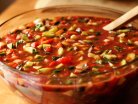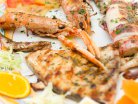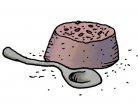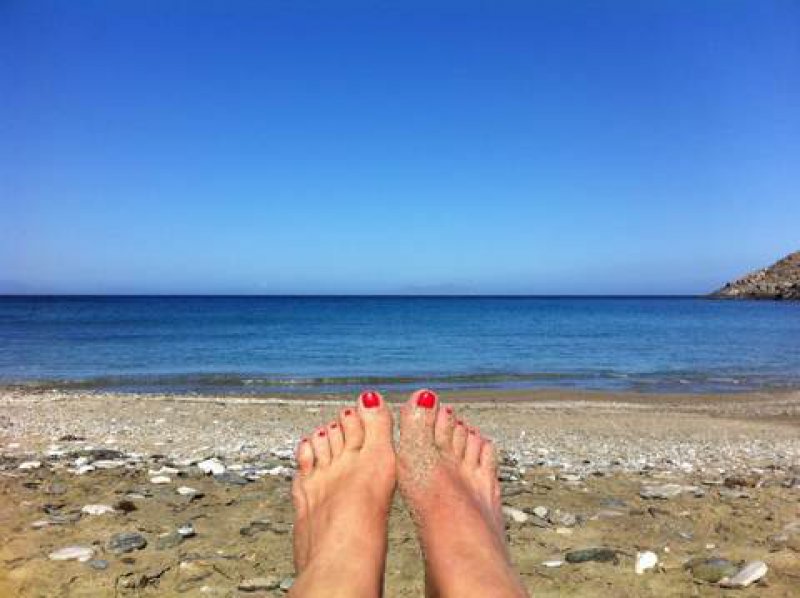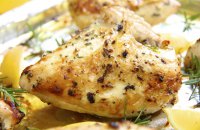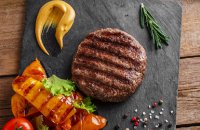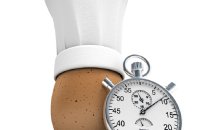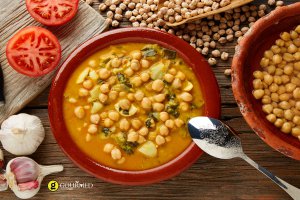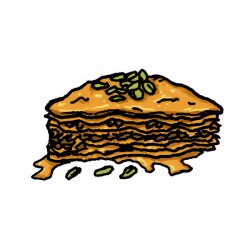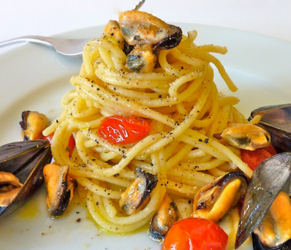Holidays are not the time for a diet. In fact, one of the things that makes holidays even more enjoyable is good food. So that you don’t return home too scared to get on the bathroom scale, it’s wise to just enjoy food in moderation. There’s no reason why you can’t sample everything, but do it in a smart way. There are ‘yes’ and ‘no’ choices in summer dining. By choosing only the ‘yes’ food, you’ll be putting pressure on yourself; however, if you only eat ‘no’ food, weight gain is inevitable. The best thing to do is to combine the two. Enjoy fattening temptations at one meal (not all meals) and simply reduce the amount you eat. If you’ve indulged in a heavy lunch, go for a piece of fruit in the afternoon rather than ice cream. By balancing things in this way, you’ll satisfy your taste buds as well as your figure. Finally, don’t forget that summertime gives you the opportunity to take part in calorie burning activities. Take full advantage of the sea, the countryside, play sports and then enjoy your favorite foods with a lot less guilt.
Don't miss meals:
Most people complain that they gain weight in summer even though they’re eating less. The reason for this is that they snack far more. Breakfast, snacks, sandwiches at the beach, ice cream, something refreshing after a siesta, something light before going out for the evening, etc. Dietitians advise that you stick to three meals a day plus two in-between snacks if necessary. Regular meals help you to control the amount and the quality of what you eat, fending off hunger, and making it easier to count the calories. By skipping meals, you actually fall into the trap of eating more.
Better choices at breakfast:
Breakfast is one of the most enjoyable meals, particularly if you’re staying in a hotel. On the one hand, you have fresh juice, fruit along with all kinds of sweet pastries and breads. On the other hand, you have the big fry-ups including eggs, bacon, and sausages. The rules for healthy eating dictate that you stick with fruit, cereal, and yoghurt. The rules of summer, however, allow you to try a ‘forbidden’ pleasure every day, though in a small quantity. If you indulge in a heavy breakfast, opt for fruit at the beach and then a light lunch.
Vegetables are fattening when fried:
Eggplant, peppers, and zucchini are the most popular appetizers in the summer version of Mediterranean cuisine. Unfortunately, these are seldom roasted. More often than not, they’re served fried and loaded with calories. In addition, they’re usually accompanied by creamy dips (eggplant dip, spicy cheese dip, and Russian salad for example), which contain even more fat. Fried vegetables become more piquant when served with tzatziki (yoghurt dip) which, however, is made from strained yoghurt containing 10% fat. Watching others tuck in and enjoy while you abstain is no solution, but you can also savour the food by not trying to fill up on fried dishes. Have the peppers with vinegar and the zucchini as ‘plain’ as possible. Choose a fresh green salad instead of chips. And finally, if the appetizers served are quite high in fat, maybe skip the main meal.
Fruit in moderation:
Three servings of fruit is the recommended daily intake. In winter, when apples, oranges are pears are in season, it’s easy to see that one serving is the equivalent of one medium piece of fruit. In summer, however, when the range is much greater and size is different, things get complicated. Below are serving sizes for popular summer fruit:
peach, 1 medium
apricot, 4 medium
watermelon, 1 thin slice
cherries, 12 large
melon, 1/3 of a small one
grapes, 15 small
figs, 2 large
Over-indulging in fruit can load you with calories. But if you’re going to overdo anyhow, fruit is your best choice.
Swim, ride and walk:
If you find it difficult to restrict your calorie intake, then a solution would be to burn them off. Swim, play games on the beach, walk, ride, and dance. All of these are fun activities that will give you a work-out and speed up your metabolism. A person weighing 75 kg will burn about 150 calories by walking for half an hour, 190 calories by riding a bike, and around 290 calories within the same amount of time by swimming.
Take care when going out in the evening:
A summer evening’s entertainment usually involves dinner followed by a drink at a bar, while a drink at the bar inevitably involves snacking on nuts. If you intend to go for the nuts, make sure that your evening meal is light. For example, go for the fish with salad. If you intend to drink later in the evening, don’t be tempted to overdo it with wine or beer at dinner. Alcohol, apart from making you dizzy, among other things, can really add calories.
Here is a list of the most popular drinks consumed during summer in Greece, along with their calorie content:
wine (1 glass), 70 calories
beer (1 glass), 110 calories
ouzo (1 drink), 150 calories
whisky (1 drink), 100 calories
gin (1 drink), 95 calories
vodka (1 drink), 95 calories
Quench your thirst with water:
Water becomes even more important for the body in summer, since it plays a role in regulating body temperature. It transfers heat from the centre of the body out to the extremities and protects the body against large temperature fluctuations. To remain healthy, the average individual must drink a minimum three liters of water a day in the summer. A mistake many people make, one that proves quite costly in terms of calories, is quenching their thirst with soft drinks, juices, or coffee. These may provide the body with some water, but they’re also full of sugar. (A can of soft drink contains about 7 teaspoons of sugars, that is, 140 calories.) If you prefer sparkling drinks, go for mineral water.
Greek salad, a big trap:
Bread consumption rises significantly in the summer and this is mainly due to Greek salad. Greek salad, when eaten by one person, usually constitutes a main meal rather than an accompanying salad. It contains four kinds of vegetables (tomato, cucumber, pepper, onion), olive oil (fat) and feta (protein). Indeed, when eaten with fresh bread, you’ve covered your daily cereal requirements too (a medium slice of bread contains 80 calories). Unless the salad is your entre, the best solution would probably be to share it.
The calorie content of a Greek salad is listed below:
2 small tomatoes - 80
half a cucumber - 20
half a pepper - 10
half an onion - 10
2 tablespoons of olive oil - 270
1 piece of feta cheese - 75
Total - 465 calories
What to do about the ice cream:
Indulge. Ice cream becomes an enemy only when you eat it often and in quantities larger than one normal serving. Just remember that one serving (two scoops) of strawberry ice cream contains 200 calories. So, eating ice cream in moderation won’t put you in danger of gaining weight. But when you fill a bowl with three scoops, sprinkle it with nuts, and then drizzle with syrup, the calories mount up. For fewer calories, opt for no toppings. Or just go for the granitas instead.
How to Stay Healthy During Vacation
Continue reading to learn how to avoid gaining weight during your Mediterranean summer vacation...
Προέλευση:
Κατηγορία:
Σχετικά άρθρα
Δημοφιλείς συνταγές

































